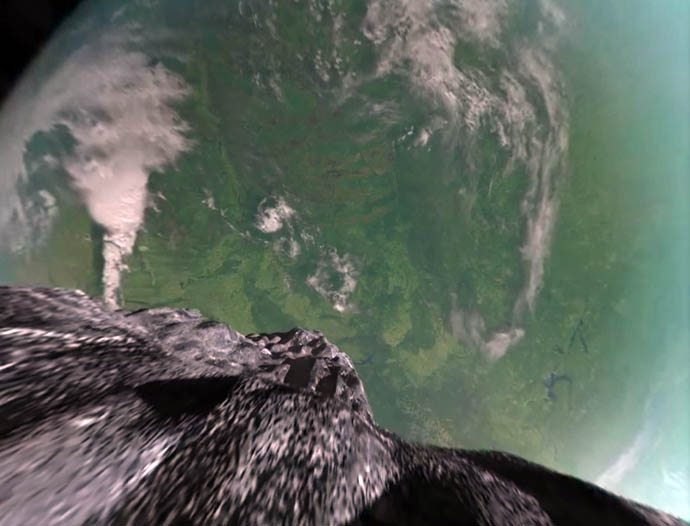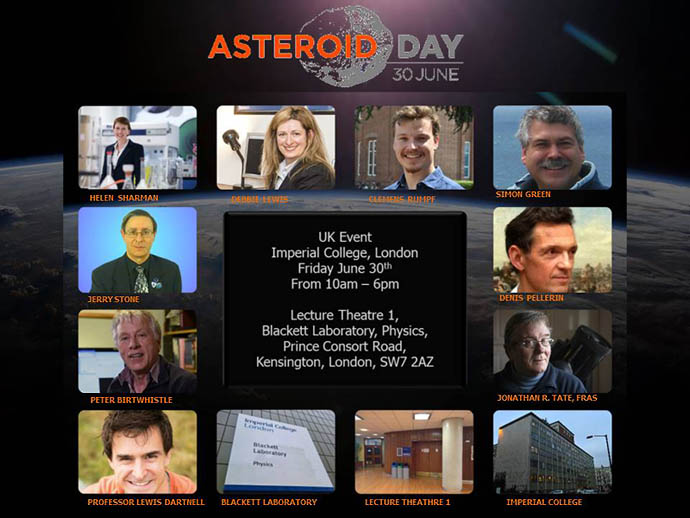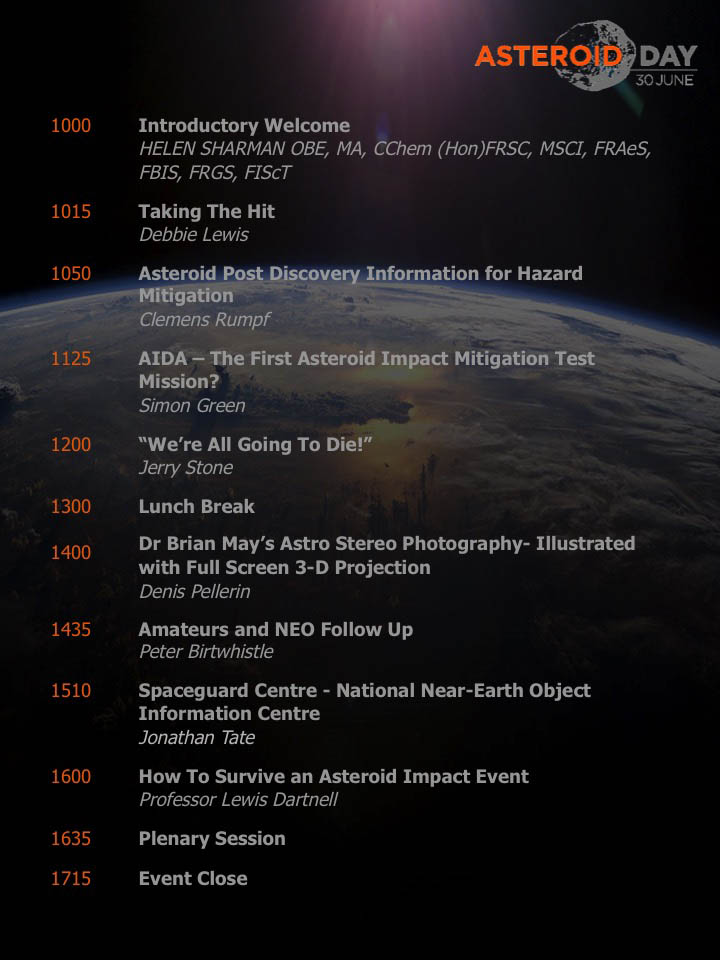FREE EVENT
Imperial College, London
30 June
For Asteroid Day programmes on Sky check out:
30 Jun Sky Ch525 DiscSci from 6AM – 5.30AM 1 Jul including “51 Degrees North” movie 30 Jun 9pm/10pm Ch557 DiscSci+1.
During the day, the channel will also premiere a new documentary, “How To Survive An Asteroid” strike”, which features much of Brian May’s interview from 2016.
How to Survive an Asteroid Strike – NEW
30 June 2017 10.04PM | 1 JULY 2017 01.10AM [62 MIN]
In this one hour special, an elite group of experts:British cosmologist and astrophysicist Lord Martin Rees, Risk and Crisis Management expert Debbie Lewis and astrophysicist and rock legend Brian May, will show viewers how to survive an asteroid strike.
SEE ANIMATION: HERE
Witness 1908’s asteroid impact today! Ride the largest meteor to hit Earth in recent history in 360°, as it barrels towards our planet, for an Asteroid Day experience like no other. Then watch HOW TO SURVIVE AN ASTEROID STRIKE on the Science Channel on 6/30!

LONDON EVENT

PRESS RELEASE:
The Asteroid Day 2017 event, which has been organised by Debbie Lewis, is being held at
Imperial College, London
Friday June 30th from 10:00 to 17:15
n Lecture Theatre 1,
Blackett Laboratory, Physics,
Prince Consort Road, Kensington,
London, SW7 2AZ
ADMISSION FREE
To attend: contact Debbie Lewis either on 07781 140517
or debbie.lewis@asteroidday.org.

About Asteroid Day
Asteroid Day is a UN sanctioned global day of education to raise awareness about asteroids and in particular how we protect Earth from asteroid impacts. Asteroid Day was co-founded in 2014, by Dr. Brian May, astrophysicist and lead guitarist for the rock band Queen; Danica Remy, B612 Chief Operations Officer; Apollo astronaut Rusty Schweickart; and German filmmaker Grig Richters. Asteroid Day is held on 30 June each year to mark Earth’s largest asteroid impact in recorded history, the Siberia Tunguska event, which devastated over 2,000 km2 of forest, an area the size of any major metropolitan city today. In 2016, Asteroid Day was declared by the United Nations to be a global day of education to raise awareness about asteroids. Founding partners include: The Association of Space Explorers, B612 and Discovery Channel and global sponsors include OHB, SES, BCE and the Luxembourg Government.
Asteroid Facts
– Asteroids are rocky objects, left over from the formation of planets in our solar system. Like planets, asteroids orbit the Sun, but most are contained in the Asteroid Belt between Mars and Jupiter.
– Asteroids pose a risk to the earth, but although the threat is low in any one year, the consequences can be serious. The earth is hit by a hundred tons of meteorites a day and there are a million or so asteroids we haven’t identified which could post a major threat to Earth’s major metropolitan cities.
– We have the technological capability to detect and track and deflect dangerous ones away from impacting Earth
Who Supports Asteroid Day?
– Asteroid Day is supported by international organizations, government agencies, local communities and leaders in science, technology, education, business and entertainment.
– Official sponsors of Asteroid Day 2017 include: United Nations, B612 Foundation, Association of Space Explorers, Government of Luxembourg, Secure World Foundation, the European Southern Observatory, International Space University, Government Space Agencies, and corporations, including prime sponsors SES, OHB System AG, the Government of Luxembourg, Cisco and others.
– Media sponsor: Discovery Communications
Specifics of the Event:
London is where Asteroid Day was co-founded. Debbie Lewis, Deputy Chair of the Asteroid Day expert panel and a specialist in risk, crisis and disaster management, is hosting guests including Helen Sharman, the first British astronaut, Clemens Rumpf, Dr. Simon Green, Jerry Stone, Denis Pellerin, Peter Birtwhistle, Jonathan Tate, and Prof. Lewis Dartnell.
Speakers:
– Dr Helen Sharman OBE, MA, CChem (Hon)FRSC, MSCI, FRAeS, FBIS, FRGS, FIScT S
cientist and astronaut, who became the first Briton in space in 1991
– Debbie Lewis MSc FEPS:
Asteroid Day Regional Co-ordinator, Risk, Crisis and Disaster Management Advisor
– Dr Clemens Rumpf
UK delegate to the UN endorsed Space Mission Planning Advisory Group
– Simon Green
Head of the Planetary and Space Science Research Group at the Open University
– Jerry Stone
Freelance Space Presenter and a genuine space expert.
– Denis Pellerin
Photo-historian with a passion for stereo photography
– Peter Birtwhistle
Great Shefford Observatory
– Jonathan R. Tate FRAS
Director of the Spaceguard Centre and the National Near Earth Objects Information Centre.
-Professor Lewis Dartnell
Astrobiology researcher at the University of Westminster
BOOK YOUR PLACE:
For more information and to book your place please contact Debbie Lewis either on 07781 140517 or debbie.lewis@asteroidday.org.